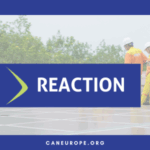Yesterday EPP MEPs chose to support industry greenhouse gas emissions, in stark contradiction with the EU’s Green Deal and climate ambition. In its plenary vote, the Parliament failed to support the “polluter pays principle” by phasing out the EU Emissions Trading System’s free allocations for those sectors where a future carbon border adjustment mechanism could be applied.
Doreen Fedrigo, Industrial Transformation Policy Coordinator at Climate Action Network (CAN) Europe said: “Yesterday’s vote would mean that the EU could continue to use taxpayers’ money to finance industries’ polluting practices. This despite the EU ETS being recognised as too weak to have an effect on reducing greenhouse gas emissions.”
Industrial pollution is still mostly allowed for free through the ETS free allocations, to the tune of around 80% of total EU emissions. This way the heavy industry made more than 24 billion euros in windfall profits between 2008 and 2014 alone.
Fedrigo added: “Yesterday’s vote in Parliament is a blow, but we expect logic, scientific evidence and coherence to prevail in the upcoming legislative proposals on the Emissions Trading System and the Carbon Border Adjustment Mechanism”.
ENDS
Contact:
Nicolas Derobert, CAN Europe Head of communications, nicolas@caneurope.org, +32 483 62 18 88
Climate Action Network (CAN) Europe is Europe’s leading NGO coalition fighting dangerous climate change. With over 170 member organisations from 38 European countries, representing over 1.500 NGOs and more than 47 million citizens, CAN Europe promotes sustainable climate, energy and development policies throughout Europe.


